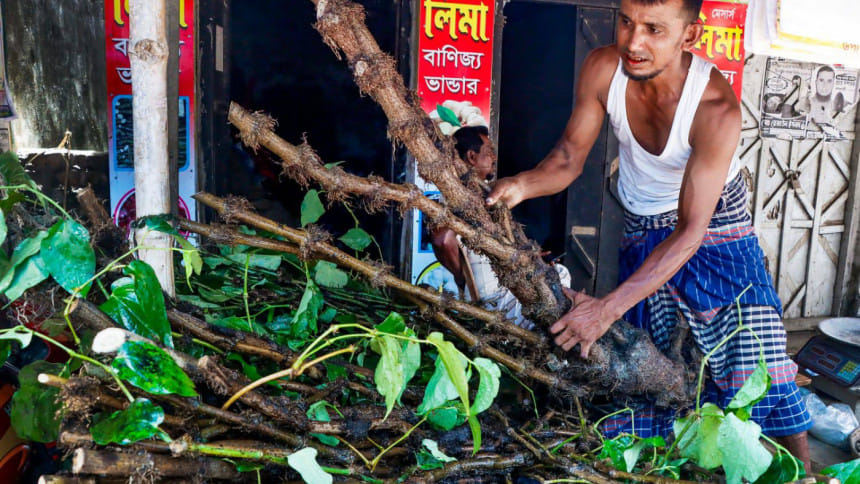Demand, prices of chui-jhal soar ahead of Eid

Chui-jhal, a traditional aromatic spice widely used in southern Bangladesh, especially in the Khulna region, is witnessing a soaring demand as well as high prices ahead of Eid-ul-Azha across the country.
Chui-jhal is a vine-like plant with greyish stem and green leaves mainly grown in Khulna, Satkhira, Bagerhat, and Jashore districts in the region. Its roots, stems, and tips are sliced into small pieces and used traditionally to cook beef, mutton, or duck. The tip of the plant is the most prized portion in the deep-rooted culinary tradition of southern Bangladesh. In recent years, the use of chui-jhal has gained popularity in Dhaka and other parts of the country.
As the Eid approaches, demand for chui-jhal has increased significantly across markets in Khulna, including Daulatpur, Rupsha, Boyra Bazar, and Gallamari Market, while the price is also on the rise. At present it is selling for Tk 800-2,000 per kilogramme.
Mamun Biswas, a seasoned vendor for over 18 years who specialises in selling Chui-jhal at Khulna's Gallamari Market, said people come from other districts to purchase chui-jhal from Khulna ahead of Eid. "We also get plenty of orders placed online," he said.
Mamun also informed that they used to purchase Chui-jhal wholesale at Tk 800 per kg, but now prices have risen to Tk 1,000–1,200 per kg, with those of the finest quality selling for as high as Tk 1,800.
Shariful Islam, another seller who sells the spice online and delivers across Bangladesh via courier services, said the demand for it surges during Eid, with most orders placed from Dhaka.
"Currently, premium Chui-jhal is priced at Tk 1,200-1,800 per kg," he added.
Interestingly, while Rangpur, Kurigram, and some hilly regions are major producers of Chui-jhal in the country, the locals there are not accustomed to consuming it. People from southern districts like Khulna are culturally tied to the spice's use to cook meat. Many locals say a meal feels incomplete without chui-jhal.
"When I started selling Chui-jhal 40 years ago, it fetched only Tk 2 per kg. Now, depending on quality, it sells for Tk 600–1,600 usually. However, during Eid, both demand and prices go up significantly," said Md Abdar Sheikh, a trader at Daulatpur Market.
"Typically, about 100 grammes of chui-jhal is used to cook 1kg of beef," he also said, adding that three traders at the market, including him, sell a total 400 kg chui-jhal monthly.
Nabodip Mallick, owner of 'Chui Nabodip' from Kharnia in Dumuria upazila, said it takes six months to a year for a chui-jhal plant to mature, before the entire plant is cut down to harvest usable parts.
"Usually, I sell 10–11 kg a day, but during Eid, sales go up to 20–30 kg daily," he added.
"Without Chui-jhal, taste of beef or mutton doesn't feel complete. I bought 300 grammes for Tk 360 for Eid," said Saiful, a resident of Nirala area of Khulna city.
Another customer, Sohel Rana, echoed him.
A total 576 tonnes of chui-jhal were produced in the 2022–23 fiscal year in Khulna, Bagerhat, Satkhira, and Narail districts, up from 347 tonnes the year before. The output has more than tripled over the past six years due to rising market demand and increased farmer interest in commercial cultivation, said Md Rofiqul Islam, additional director of the Department of Agricultural Extension in Khulna.
"Chui-jhal is also valued for its medicinal properties. The plant's roots, stems, leaves, flowers, and fruits are all said to have health benefits," he added.

 For all latest news, follow The Daily Star's Google News channel.
For all latest news, follow The Daily Star's Google News channel. 


Comments